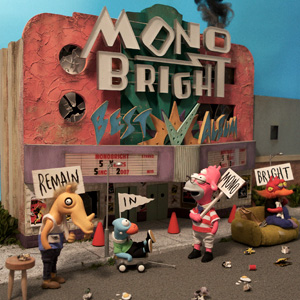MONOBRIGHT
Remain in MONOBRIGHT
Review by Jen Wang

A band obviously loves their songs when they don’t stop at thirteen songs in their greatest hits. MONOBRIGHT’s nineteen-song compilation includes both the more popular singles and the hidden gems from their albums. Remain in MONOBRIGHT is a fun ride with many twists and turns along the way.
Yosuke Momono’s vocals can be harsh at times, but there is no denying the passion and honesty behind them. As the title suggests, “NAMIDARO FRUSTRATION” has him practically growling out some of the lyrics, yet he remains so beautifully in control. There’s angst without whining. In “Ano Toumeikan to Shonen”, Momono displays a youthful excitement every time he stresses a syllable. Guitarist Shogo Matsushita steps in as a secondary voice with his wailing solo. Of course, there’s also the “hoo hoo”s that make the song even more lighthearted and free. MONOBRIGHT’s aggressive side comes through in “EIYUU NOVA” with Momono practically shouting over the heavy guitar riffs and rumbling bass.
Some of the most noteworthy songs are the ones that conjures up a new setting. The screeching guitars and synthesizer effects give “UCHUU NO ROCK” a futuristic sound, and Momono’s voice is distorted as though the band is transmitting from outer space. “Joy Joy Experience” takes the listener to a “Love Shack” kind of party; there’s even the sassy rap-like vocals. The addition of brass further expresses the celebratory mood. “Odoru Nou” evokes a Japanese festival with the rapid high-pitched guitar riffs and the bridge, which contains the swung 2/2 rhythm of an ondo (a type of traditional folk song).
Near the end of the album, MONOBRIGHT flashes back to the early 90s when dreamy alternative numbers were big. In each of the three songs in this style, Tsubasa Takitani raps out a steady beat while the guitars create a wall of sound. “Come Together” stands out the most, as it features a second layer of vocals by former member Toru Hidaka and is less sleepy. Although it’s nice to see the band’s gentle side, they do best when they can have more energy. “MOONWALK” provides a nice transition out of this style, as its surreal intro gives way to a more playful sound with prominent keyboards and Hiroyuki Deguchi showing off his skills in a complex bassline.
Remain in MONOBRIGHT is not without a few misses. Its most recognizable track, “Anata Magic” (which was an opening to Gintama), ironically falls under the category of generic anime rock songs while “Wonder Wall” gets overwhelmed by the noisy wall of sound. Nevertheless, the band ends on a strong albeit chaotic note with “Revolution”. Each member seems to be playing in his own style, and the mood wanders. However, this works to the song’s advantage because it expresses everyone’s enthusiasm and cheer. This album too goes through a myriad of moods and settings while highlighting the fact that MONOBRIGHT enjoys what they do and always gives their 100%.
